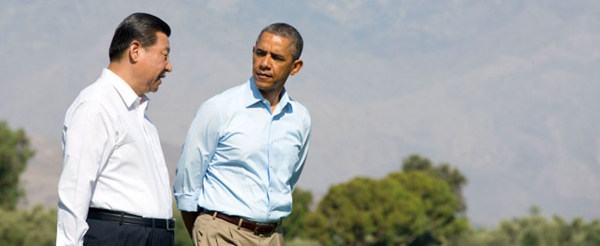by Peter G. de Krassel
[dropcap1 variation=”red”]T[/dropcap1]he “trust deficit” that hampered relations between Beijing and Washington before Xi Jinping made his Valentine Day visit to Washington in February 2012 unfortunately still lingers after his weekend Sunnylands summit with Obama. Xi’s February tour came at a politically challenging time in U.S.-China relations, with the White House sending stern messages on currency and trade policies, and Republican presidential candidates claiming Obama isn’t doing enough to keep America’s economy competitive with China’s.
The fact that Xi has a sister in Canada, a brother in Hong Kong and a daughter at Harvard, all suggests someone who might push forward a closer bilateral working partnership. This was confirmed the day after his Valentine dinner with Obama in a policy address to business leaders. He said that “cooperation between China and the United States cannot be closed by any force. On the contrary, it will open wider and wider.”
“The trust deficit sums up a very clear fact: that is, the level of mutual trust between China and the United States is lagging behind what is required for the further expansion of our bilateral relationship,” said Chinese Vice Foreign Minister Cui Tiankai on the eve of Xi’s Valentine Day visit to the U.S. in a speech delivered to commemorate the 40th anniversary of the Shanghai Communique signed during U.S. President Richard Nixon’s ground-breaking visit to China.
The trust deficit was there for all to see at the Munich Security Conference in February 2012. Zhang Zhijun, China’s vice minister of foreign affairs, waffled on about how “the people of Asia” had chosen a different path from the West and how the West should simply leave China to go its own way. And by the way, there was no problem at all in the South China Sea, where everyone enjoys free navigation.
Sitting next to him, U.S. Sen. John McCain launched into a ballistic attack. It is a matter of concern, he said, when a Vietnamese ship has its cables cut by a Chinese vessel. The Vietnamese remember 2,000 years of Chinese domination. People are immolating themselves in Tibet. The Arab Spring represents universal aspirations and “the Arab Spring is coming to China,” he said.
To craft a new Pax Pacifica is therefore the great strategic challenge of our time facing Obama and Xi — and one they are clearly determined to meet after their Sunnylands Summit.
President Nixon’s week-long visit to China in 1972 concluded with the publication of the Shanghai Communique that established the principles for normalizing U.S.-China relations. The visit represented one of the most dramatic and transforming diplomatic initiatives of the 20th century. Full normalization of Sino-American relations was completed by former U.S. President Jimmy Carter and China’s Deng Xiaoping in late 1978.
For Chinese leaders, Xi’s visit and his two day meeting with Obama just two months after taking office is unprecedented. His predecessor Hu Jintao visited the U.S. after three years in office.
Since becoming general secretary of the Communist Party in China last November, he has emphasized injecting “positive energy” into the China-U.S. relationship. Obama has made similar pronouncements.
The times have changed dramatically. In President Nixon’s time the relatively new technology of television could be used to change public opinion “from the top down.” Today, the Internet and social networking media give people the ability to exert political influence “from the bottom up.”
Both countries today must confront the primary source of economic tension – the shared concern with “jobs, jobs, jobs.”
“In the Cold War era, the shared strategic concern with the Soviet threat helped pull the two countries together. Today the common concern with jobs tends to pull the countries apart, although the reality is that globalization has created enormous numbers of jobs in both countries,” wrote Richard H. Solomon, the president of the United States Institute of Peace in an editorial opinion in the China Daily.
The Sino-U.S. relationship can create more jobs in both countries and reduce, if not eliminate, unemployment — and distrust. Americans can be put to work on farms and infrastructure projects to get food from farms to storage and port facilities to export to China to feed the masses there. Chinese can participate at both ends of the food chain by investing and providing the labor force to educate farmers there on America’s agricultural technologies and distribution systems to get the food to China’s hungry masses.
China became the top market for U.S. farm goods in 2011, and its appetite keeps growing. While Xi and Obama focus on getting to know and trust each other and setting a positive tone for the U.S.-China relationship, hopefully experts from the two governments are preparing constructively for the annual Strategic and Economic Dialogue to be held in Washington next month and will bridge the trust deficit.
Photo by Pete Souza, The White House

